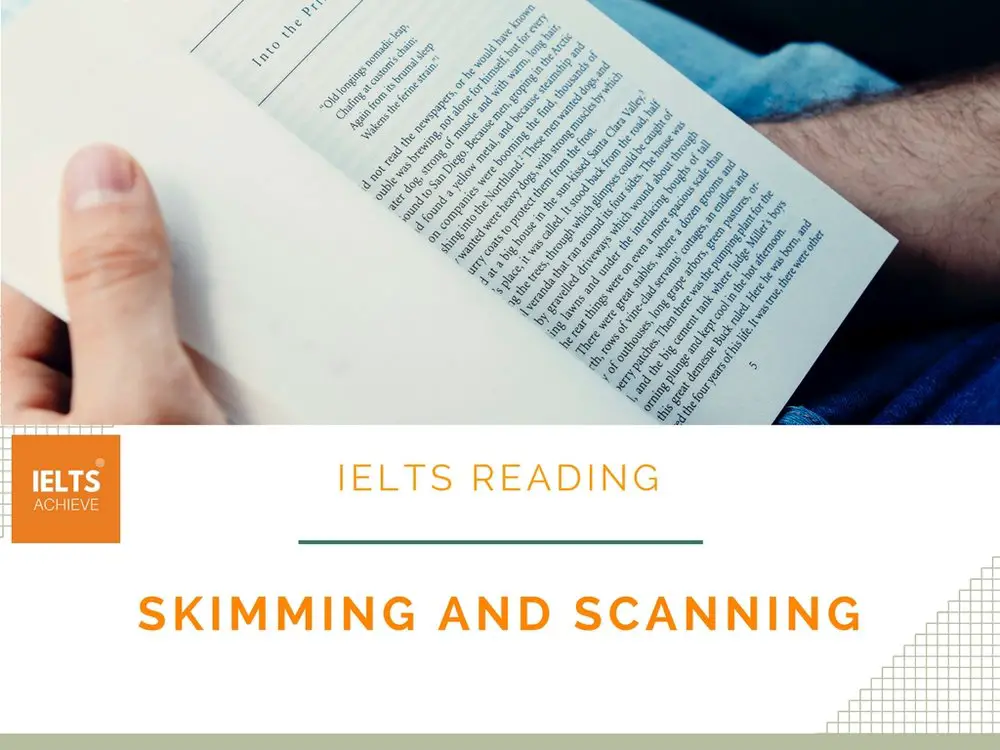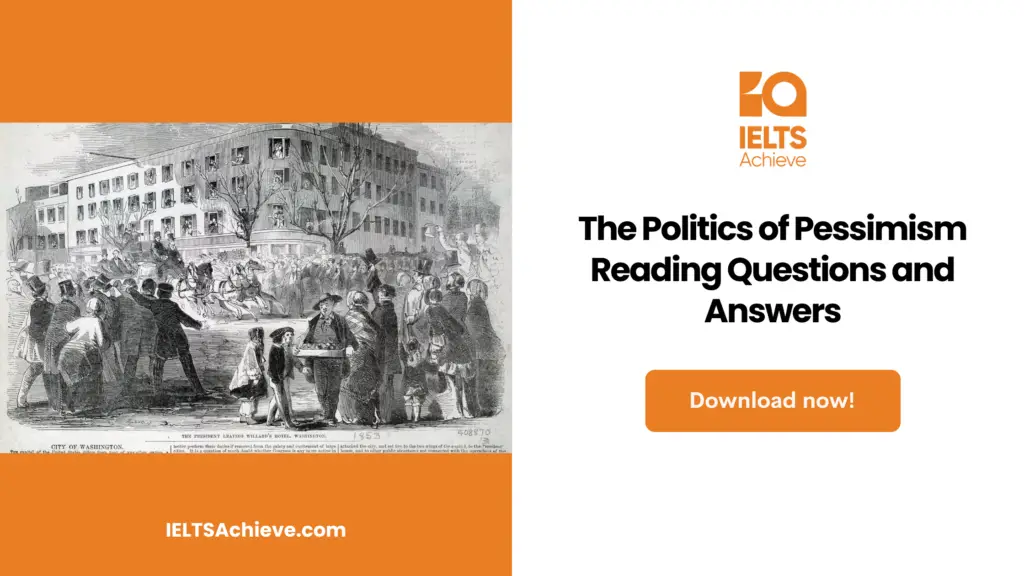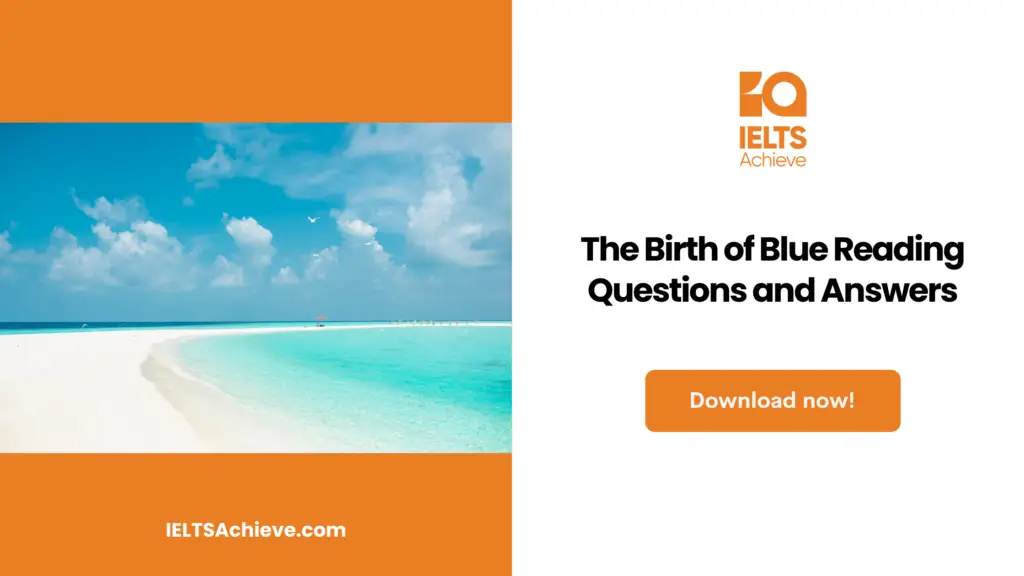
In this post, we will be looking at skimming and scanning skills which are needed for the IELTS Reading Test.
In the IELTS Reading Test, you have 60 minutes to read through and answer questions on 3 texts of 1000 words or more. If you try to read every word in detail you will run out of time and lose marks. In order to get a band score 7 or above, you need to practice skim reading and scanning texts for information, making sure that you are using your time well when looking for the answers.
- Skimming – a text quickly for the main ideas.
- Scanning – looking through a text for specific details.
Skimming
When you skim read a text for the main idea, you read the text quickly to get the general idea of the main topic. When you do this, you are looking for the main idea – not the specific details. For example, you may skim read the back cover of a book jacket to get an idea of what the book is about before you decide to read/buy the book.
Skimming is an important skill because in the test you are time conscious, so you need to skim read texts in order to get the main idea, before locating specific information needed to answer questions.
TIP >> Practice skim reading by reading articles, reviews and summaries to get the main idea. Choose content that interests you, not only IELTS practice materials.
Exercise 1
Skim read the following article from The Guardian and answer the question >>
Question (Multiple Choice) >>
What does the author want to communicate to the reader?
Choose one letter A-D
A. the Brexit is to blame for many people leaving Britain
B. many Academics are leaving Universities in the EU which concerns officials
C. the government are trying to recruit Academics from outside of the UK
D. the rights of Academics in the EU
Fear of Brexit brain drain as EU nationals leave British universities
More than 1,300 academics from the European Union have left British universities in the past year, prompting concerns of a Brexit brain drain.
There has been a 30% rise in departures of EU staff in just two years, according to data released by dozens of universities under the Freedom of Information Act.
Among those universities most affected were Cambridge, which lost 184 staff in the past year, up 35% on 2014-15, and Edinburgh, which lost 96 EU staff, up from 62 in 2014-15. However, the figures do not take into account new staff arriving from the EU.
The 64 universities that offered a figure for the past year said that 1,393 EU staff were leaving. While many will leave as part of natural turnover, it has prompted concerns that the government’s refusal to guarantee the rights of EU nationals is having an adverse effect on their ability to retain staff.
A recent analysis by the Russell Group, which represents 24 of the UK’s leading universities, found that there are 24,860 members of staff from other EU countries at UK universities, making up 23% of all academics.
Sally Hunt, the general secretary of the University and College Union, said: “These findings are worrying and highlight how damaging the government’s refusal to guarantee the rights of EU staff can be. Theresa May may wish to style herself as the strong and stable candidate, but she is creating dangerous insecurity in our universities.
“By its very nature, higher education is international, and the exchange of knowledge across borders is critical to its success. If we are to preserve our global reputation for excellence, our universities must be unencumbered when it comes to attracting and retaining overseas staff and students.”
Tim Bradshaw, the Russell Group’s acting director, also called for reassurances. “Students, lecturers, researchers and professional services staff from across Europe have helped make our higher education sector a world leader,” he said. “We want them to stay after the UK leaves the EU. We need an immigration system that lets us recruit and retain the best minds from around the globe.
Sally Hunt, the general secretary of the University and College Union, says Theresa May is creating ‘dangerous insecurity’ in universities. Photograph: Sarah Lee for the Guardian
“We have called on the government to guarantee that EU citizens living and working in the UK will be able to stay and the rights they have at present will be respected. International staff and students are our number one Brexit priority bar none.”
Julian Huppert, an academic and Liberal Democrat candidate for Cambridge who compiled the data on the departure of EU academics, said Brexit risked leading to a “sharp rise” in people from Europe leaving.
“Theresa May bears some responsibility, for pursuing an extreme version of Brexit that will rupture our ties with Europe and fail to guarantee the rights of EU nationals,” he said. “But Labour’s refusal to back free movement, instead of giving their backing to May over Article 50, means that there is no comfort there.
“Lib Dems will stand up for the rights of EU citizens and give people the final say, with a chance to reject a bad Brexit deal and remain in the EU.”
Universities minister Jo Johnson said that throughout the Brexit process, the Tories would “ensure the UK remains the go-to place for scientists and innovators, securing the status of EU nationals in Britain and British nationals in the EU and increasing spending on R&D”.
“Theresa May has a plan to make a success of leaving the EU so our world-leading universities continue to thrive,” he said. “All the Lib Dems offer is Jeremy Corbyn as prime minister, in a coalition of chaos that would disrupt the Brexit negotiations and put our future at risk.”
Answer at the bottom of the page.
REVIEW AND STRATEGY (Skimming)
TIP >> Read the instructions before you start reading the questions or the text.
TIP >> Read the questions.
TIP >> Skim read the text and look for the main idea.
TIP >> Choose your answers through an elimination process. Which ones do not fit? Which ones can you dismiss? Don’t be fooled by the answers that use the same words as the text.
Scanning
When you scan a text to find the information you do this quite quickly to find what you need. You normally use this skill when you are looking for facts. For example, if you are looking for a train time or the departure gate you need at the airport, you scan the board’s looking for the information. Therefore, you use this skill every day when looking at times, dates or places.
TIP >> Practice scanning by looking for information in timetables, the TV guide etc and find facts you need quickly.
Exercise 2
Scan the following article from The Economist and answer the questions >>
Questions (Matching Features) >>
- BBC Employees
- Zipcube
- Stanford University
A. often have to ask permission to work from home
B. do not always have somewhere to work
C. is a company providing alternative places for people to work
D. says sharing a desk is quite common
E. research says that working in an office place is better than working from home
Answers are at the bottom of the page.
Mind if I take this space?
EVERY morning workers at the British Broadcasting Corporation (BBC), Britain’s public-service broadcaster, rush into New Broadcasting House, the company’s home in central London. It is not because they cannot wait to start work. Rather, they are involved in a daily scramble to secure a desk in the offices: the corporation has committed to “hot-desking”, a gauche office trend whereby no one seat is assigned to a single person. So irksome is the hot-desking problem, it was made fun of in “W1A”, the broadcaster’s recent navel-gazing sitcom.
To alleviate the pain, BBC employees could open their web browser—and seek alternative workday shelter. A growing number of services provide this. ShareDesk, a two-year-old startup, for instance, offers 2,400 different workplaces in 70 different countries across the globe. It lists workspaces on its website and provides a booking service for venues and prospective renters. Listings are free, and customers booking the space pay no booking fee to ShareDesk. Rather, the company takes a 15% cut from the provider of the space for carrying out the transaction.
Another example following a similar model is Zipcube. Launched earlier this year, the firm helps users find offices in 180 different locations around London—a number that will double by next month. By the end of 2014, Zipcube hopes to expand to other cities in Britain and European business hubs. Those seeking offices pay the same amount for a booking made through Zipcube as they would by contacting a venue directly. Those offering space can list available venues for no cost, but the company takes 15% in commission on any booking, an industry-standard cost.
These services are more flexible than established providers of office space, such as Regus, the world’s biggest with revenues of £1.5 billion ($2.5 billion) in 2013, says David Hellard of Zipcube. Finding a venue for a workday or a business meeting can be tough and time-consuming: many buildings only offer certain amenities; most don’t offer online booking.
Booking space on sites like Zipcube also beats other alternatives. It may not be cheaper, but certainly more comfortable than gently nursing a quickly cooling cup of coffee for several hours in order to use a café’s free Wi-Fi. It is more productive than working from home, according to recent research by economics professors at Stanford University. And management wages point to an increase in inventive thinking when people meet in short-term co-working spaces.
There is another potential benefit, too: many workers in traditional offices gripe about the co-workers with whom they share a space. With one click, you can whisk yourself away from the loud talker in the next cubicle and into a new, quieter, office.
Answer at the bottom of the page.
REVIEW AND STRATEGY (Scanning)
TIP >> Read the instructions before you start reading the text. Make sure you understand what the question is asking you to do.
TIP >> Read the names/ places first and scan the text to find them. You can underline/highlight them – they may be mentioned more than once.
TIP >> Look for the connection between their name and what they have achieved etc, that relates to the options. Be wary of synonyms and paraphrasing.
TIP >> Choose your answers through an elimination process. Which ones do not fit? Which ones can you dismiss?
Answers >>
Exercise 1 Answer >>
B
The main idea of the article is that many Academics are leaving Universities in the EU which concerns officials. The writer is sharing data led information and linking it to the Brexit, saying that the government cannot ‘guarantee the rights of EU nationals‘.
Exercise 2 Answers >>
1 – B
2 – C
3 – E
We hope you found this post useful in helping you to study for the IELTS Test. If you have any questions please let us know in the comments below or on the Facebook page.
The best way to keep up to date with posts like this is to like us on Facebook, then follow us on Instagram and Pinterest.
If you need help preparing for the IELTS Test, join the IELTS Achieve Academy and see how we can assist you to achieve your desired band score. We offer an essay correction service, mock exams and online courses.

